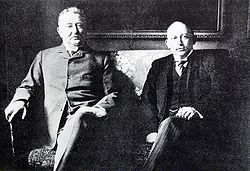Jameson raid
| Jameson Raid | |||||||
|---|---|---|---|---|---|---|---|
| Part of the Boer Wars | |||||||
 Cecil Rhodes and Alfred Beit, instrumental in the Jameson Raid |
|||||||
|
|||||||
| Belligerents | |||||||
|
|
|
||||||
| Commanders and leaders | |||||||
|
|
|
||||||
| Casualties and losses | |||||||
| 18 killed and about 40 wounded | 4 killed and 5 wounded | ||||||
|
|
|||||||
|
|
The Jameson Raid (29 December 1895 – 2 January 1896) was a botched raid against the South African Republic (commonly known as the Transvaal) carried out by British colonial statesman Leander Starr Jameson and his Company troops ("police" in the employ of Beit and Rhodes' British South Africa Company) and Bechuanaland policemen over the New Year weekend of 1895–96. Paul Kruger was president of the republic at the time. The raid was intended to trigger an uprising by the primarily British expatriate workers (known as Uitlanders) in the Transvaal but failed to do so. The workers were called the Johannesburg conspirators. They were expected to recruit an army and prepare for an insurrection. The raid was ineffective and no uprising took place, but it was an inciting factor in the Second Boer War and the Second Matabele War.
What later became South Africa was not a single, united nation during the late nineteenth century. Rather, the territory had four distinct entities: the two British colonies of Cape Colony and Natal; and the two Boer republics of the Orange Free State and the South African Republic, more commonly referred to as the Transvaal.
The Cape, more specifically the small area around present day Cape Town, was the first part of South Africa to be settled by Europeans; the first immigrants arrived in 1652. These settlers were transported by, and remained under the control of, the Dutch East India Company. Gradual consolidation and eastward expansion took place over the next 150 years; however, by the beginning of the nineteenth century, Dutch power had substantially waned. In 1806 Great Britain took over the Cape to prevent the territory falling into Napoleon's hands and to secure control over the crucial Far Eastern trade routes.
...
Wikipedia

